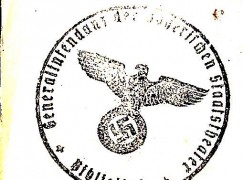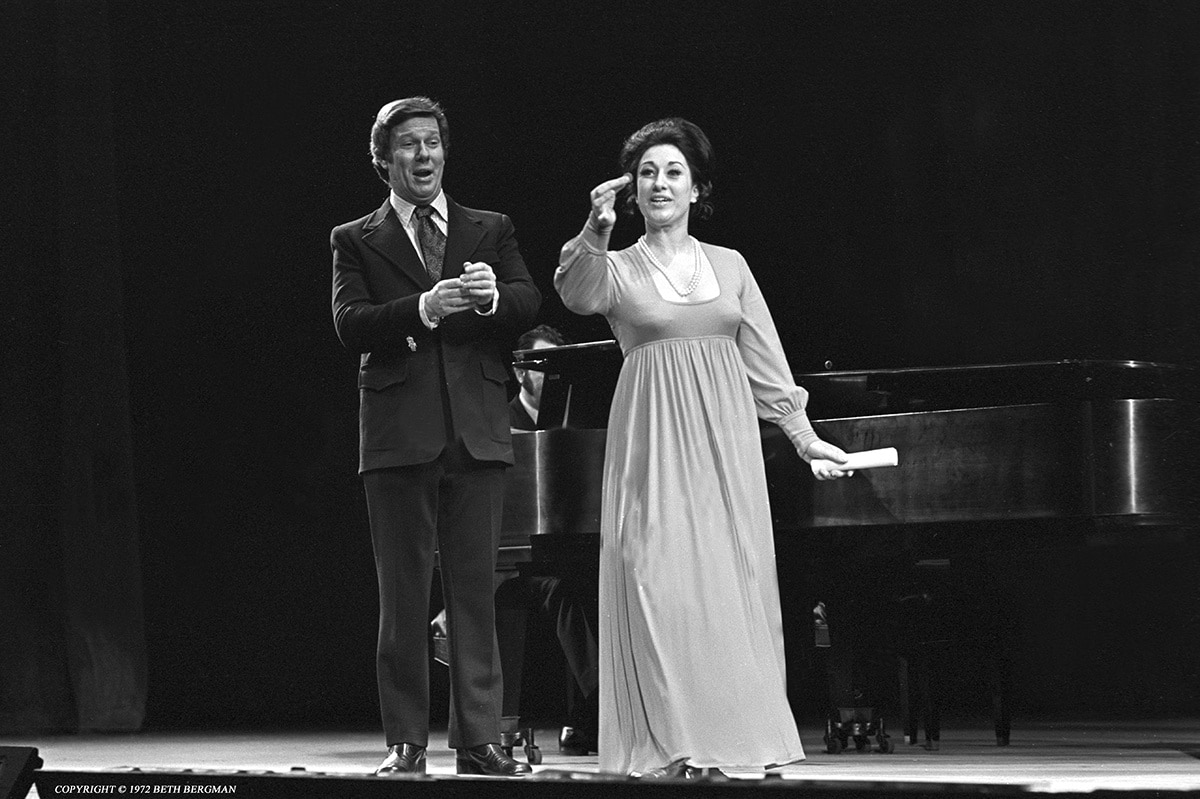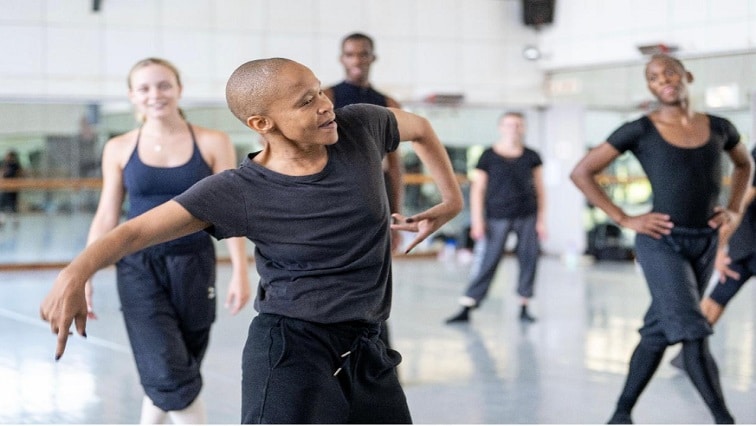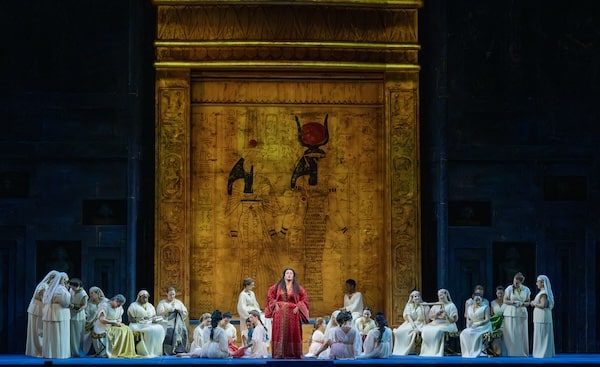The sound of five silenced composers
mainFrom the Lebrecht Album of the Week:
Quarter of a century ago, Decca sank its Three Tenors profits into an ‘Entartete Musik’ series, breaking the silence that had settled on a generation of composers who had fled Nazi Germany, or died in its concentration camps. Those vital recordings are now hard to find, but the search continues for other members of the silent generation.
None of the music on this gripping compilation will be familiar to anyone alive….
Read on here.
And here.






Walter Susskind was the Toronto Symphony Orchestra’s music director from 1956-1965. Louis Gruenberg’s Violin Concerto was recorded by Heifetz/Monteux.
And he made some terrific Dvorak recordings with St. Louis for Vox.
Susskind’s tenure as Music Director of the St. Louis Symphony from 1968-1975 was largely responsible for helping to foster my love of classical music. He raised the quality of the orchestra’s playing and won it new respect through recordings. He also hired Leonard Slatkin as assistant conductor and assigned him the responsibility of reaching out to youth audiences and pursuing some special programming initiatives, which helped to shape his profile in the professional music world. Susskind also composed a terrific orchestral piece, Capriccio Concertante, which he conducted at least one time each with the St. Louis and Cincinnati Symphony Orchestras. It would be great to have a recording of it as well, but kudos to Channel Classics for this recording, which as far as I know is the first of a Susskind composition.
Sounds very interesting, thanks Norman!
A year or two ago I wrote an article on ‘Entartete Musik’ on Chanel Classics:
https://basiaconfuoco.wordpress.com/2016/05/25/entartete-music-teresienstadt-en-channel-classics/
This article is also available in German translation:
https://basiaconfuoco.wordpress.com/2016/09/22/entartete-musik-theresienstadt-und-channel-classics-deutsche-ubersetzung/
Josef Matthias Hauer should be better known. He is a forgotten genius in music history. If for nothing else, he invented the twelve tone method of composition. This injustice MUST be rectified!
Why? Hauer is like a rather stale Pizza without any topping. Boring as hell mate. Forget wrong noters stick to the real McCoy such as this!
https://www.youtube.com/watch?v=jzYzVMcgWhg
You must be tone deaf mate. Hauer is as dull as a wet sunday in Hudderfield. His atonal stuff just wanders about aimlessly without an endpoint, there is not even a tune in sight. LOL.
Hauer according to JB is like a stale pizza without any topping. Stick to real music mate, you know L V B or JSB or GFH. Forget Hauer et al, just a blind alley. Same with the udder ones.
No wonder they all gone banned, they could not compose a song as good as this one! (Lyrics Ted Crilly, Music Dougal Maguire). I think the Sax solo is the best part.
https://www.youtube.com/watch?v=jzYzVMcgWhg
Thanks so much for sharing this, Norman. There is certainly a wealth of music from this period in what is now history. Hopefully, over time, these composers and their music will be brought out of hiding.
Not every composer get banned will automatically become a great master. See pussy riot. There must be a reason why people don’t want to hear their music anymore.
“five composers” “every composer”
“NOT every composer”.
Furthermore, as far as I know, the series of Entartete Musik cover far more than these 5 composers. Most of them don’t get performed very often nowadays, be it so famous as Alexander von Zemlinsky. Hardly any people would name them as their favorite composers, or even top 10.
People complain that the warhorses get recorded too much and then when someone brings out something that’s been overlooked you’re all, “it’s not famous enough!”
…. indeed – and then, audiences are often treated on new music which cannot stand comparison with the average entartete Musik we don’t know.
JB all wrong notes sound the same whether they were composed in a prison camp or outside of one. The world has moved it’s the 21st century we want tunes again! Like this.
https://www.youtube.com/watch?v=jzYzVMcgWhg
The reason why folk do not want to listen to their stuff anymore is its so boring and tuneless, life is too short to waste on wrong notes! LOL. Here is some music to make you laugh!
https://www.youtube.com/watch?v=jzYzVMcgWhg
Music of Remembrance, based in Seattle, has done much to bring this music to today’s audiences. http://www.musicofremembrance.org
Another good source for this music is a series of CDs Steve Honingberg and the Potomac String Quartet released in the late 90s on the Albany label.
Thank you Neil. I didn’t feel it necessary to copy the excellent Entartete Musik series but branched out to neglected composers, banned composers, exiled composers and in some cases composers who wrote music for my series dear to their hearts. The series, from 1994-2002, featured 40 concerts. To my chagrin, the series abruptly ended because the museum disliked my effort to record this music without their explicit permission thinking that I was making money off their name. Their assumption was a completely erroneous one.
Albany Records:
DARKNESS & LIGHT
Music Performed in Concert from The Chamber Music Series at the Holocaust Memorial Museum
STEVEN HONIGBERG, MUSIC DIRECTOR
Paul Ben-Haim – Sonatina for Piano, Op. 38 (1946)
Robert Starer – Elegy For A Woman Who Died Too Young (violin & cello 1990)
Herman Berlinski – From The World Of My Father (cello & piano 1948)
George Perle – Hebrew Melodies for solo cello (1945)
Moisei Vainberg – Piano Trio, Op. 24 (1945)
Darkness & Light, Vol. 2
Józef Koffler – Sonatine for Piano, Op. 12 (1930)
Szymon Laks – Passacaille for cello and piano (1946)
David Diamond – String Quartet No. 1 (1940)
Olivier Messiaen – Louange à l’éternité de Jésus (1940)
Mario Castelnuovo-Tedesco – Piano Trio No. 2 in G (1932)
Paul Ben-Haim – Music for Violoncello Solo (1974)
Darkness & Light, Vol. 3
Robert Stern – Hazkarah for cello and piano (1998)
Tom Myron – Käthe Kollwitz (for soprano and string quartet 1998)
Lukas Foss – Anne Frank for cello and piano (1999)
Karl Weigl – Piano Trio (1939)
Darkness & Light, Vol. 4
Leó Weiner – Románc Op. 14 for cello and piano (1921)
Robert Starer – Song of Solitude for solo cello (1995)
Erich Wolfgang Korngold – Don Quixote: Sechs Klavierstücke for solo piano (1909)
Benjamin Lees – Piano Trio No. 2 Silent Voices (1998)
Great list.
Moise (Meczislav) Weiberg fled Poland to the Soviet Union in 1939. He had been prosecuted there in 1953 as a “rootless cosmopolitan” or a participant of an anti-Soviet Jewish Conspiracy and was rescued due Schostakovich involvement after Stalin’s death. Now his composition are frequently performed (and promoted) by Gidon Kremer. This particular Trio op 24 I found on a Russian site; there are 2 inter[retations by people I do not know.
http://classic-online.ru/ru/production/76851
Leo Smit was a great Dutch composer who was murdered. Flothuis survived a prison camp. Josef Tal made it to Palestine. There are many more such composers, and until every single one of their works is recorded and published, there should be a worldwide moratorium on any performances of Richard Wagner and Richard Strauss.
That is assuming RW and RS have some responsibility for the holocaust and suppression of Jewish composers. But that is a questionable idea and a much more complex issue than it may seem on the surface. If some justice towards ‘entartete’ composers should be exercised, reduction of works by composers which are overplayed would be more sensible: Beethoven, Rachmaninoff, Mahler, and all modernist works + the quasi-hip which is really ‘entartet’.
But, in the last century, composers did not need to be ‘entartet’ to get ignored, condemned, mocked, marginalized – not following ideology was mostly enough:
http://www.musicweb-international.com/books/Pauls_two_centuries_in_one.pdf
The link with fascism and communism is clear.
See also the recordings and the excellent work of the ARC Ensemble based at The Royal Conservatory of Music in Toronto and under the capable leadership of Simon Wynberg: http://www.arcensemble.com/recordings.php
Michael Haas’ blog Forbidden Music (based on his book of the same title) is also an invaluable resource: https://forbiddenmusic.org/
Also: the Exil Arte Centre in Vienna:
http://www.exilarte.at/home_en.html
Here are my thoughts:
Composers should neither be silenced because they write music in the “wrong” style, nor should they get promoted or deserve more respect simply because they got censored and prosecuted by a dictatorship. In the end of the day, being a victim of Nazi and being a great composer are two totally uncorrelated events.
These composers of “Entartete Musik” already suffered a lot when they were alive. To my dismay, people continue to consume their tragedy long after their death, in the name of justice. Nevertheless, the real reason behind such kind of revival and promotion is just because the name “Entartete Musik” sells and victimship under Nazi can gather more “likes” and sympathy from the public. It’s just like all those gender, minority, global warming, organic and similar PC stuffs, which have become extremely popular and almost unimpeachable nowadays. Things with these labels sell very well because they are so easy and comfortable to consume. People’s conscience will feel better immediately without having to make any substantial efforts to solve the problems in the reality.
Will these composers be digged out again and catch our attention if they were not prosecuted by the Nazi (in other word, merely one of Arnold Schoenberg’s less talented contemporaries)? Probably not. Will they get widely performed if they somehow benefited from the Nazi regime during their life time? Definitely never! Let’s take a look at Hans Pfitzner and Franz Schmidt. Both were truly great composers at their time. Both become, albeit unofficially, kinda persona non grata in our time. However, these two men never killed anybody. They didn’t even hold any significant positions in the Nazi regime like Richard Strauss and Wilhelm Furtwängler did. All they did was following the wrong ideology. Is there any essential difference between this kind of censorship and that by the Nazi? Kaum.
Ironically, some of the composers of so-called “Entartete Musik” weren’t even against the Nazi. A good example was Anton Webern, a well documented sympathizer of the Third Reich. All these banned composers were victims of a terrible totalitarian dictatorship, but not necessarily dissidents and heroes. Most of them were only Mitläufer, just like numerous Nazi Mitläufer. They just happened to compose in a style which the Nazi didn’t like.
Maybe you really like Entartete Musik. Or maybe you just naively believe that “your enemy’s enemy is your friend” and your conscience will feel better when listening to some music the Nazi didn’t like?
BTW, “entartet” is an extremely terrible word. Just imagine, Donald Trump ban some composers he doesn’t like and call their works “retarded music”. Will you sell this music again as “retarded music” after Donald is gone? OK, there two words are not exactly the same, but in a certain sense somehow pretty close … I’m appalled by how scrupulous businessmen can be and how naive consumers are.
‘Entartete Musik’ is NOT a brand or label for easy consumption, but simply an attempt to correct some serious errors in music history. If WW II had not happened, these composers may have had many more chances. These composers were duped twice: first by the nazi tragedy, and then after the war, by the mental climate in contemporary music which wanted to make a drastic cut with the past and begin with ‘Stunde null’, begin from scratch, and ignore what had been composed before that ‘holy’ hour because all of that was connected with the Untergang des Abendlandes – all modernist ideology.
So, these prewar composers suffered twice from totalitarian ideology, first nazism and then modernism (which is a brain child of totalitarian ideology). Established music history has ignored these prewar composers from the ‘line of development’ where ‘new ideas’ marked the defining moments, which is nonsense of course. The digging-out of forgotten music history can only be an enrichment of the art form, and that conclusion is even another one than the justice factor.
I remember a fantastic cello concerto by Ernst Toch from the twenties, which is a brilliant work, but only recently dug-out by the Kammersymphonie Berlin. If there had not been these crazy political catastrophes, Toch would have become an established, important composer. But he emigrated to the USA, landing in teaching jobs, and his music was forgotten, both in America and in Europe. Another example is Walter Braunfels whose operas appeared to be very good, when revived recently in Germany. 20C music history would have looked entirely different if the Viennese art academy would have admitted young Hitler and made sure he got a well-paid teaching post in drawing postcards.
There are many reasons why composers don’t get chances, some are deserved, others not. A world war is certainly an undeserved blow. To throw the works of the victims in the dustbin of consumerism is almost as bad as the ‘entartet’ ideology was.
Fact is, composers used to write something people would like to hear. While great composers opened up new era and trends, the mediocre ones just followed and mitschwamm. It was their music which caught people’s attention, then came the anecdotes, the affairs etc., but not the other way around. In any case, “people don’t like or don’t care” has never been a seal of quality. However, now that music alone won’t sell anymore, some smart businessmen come up with a genius idea: we sell stories! The first CD of the Decca Entartete Musik (436 631-2) was published in 1993, the same year of the movie Schindler’s List. What a coincident. They offered exactly what people wanted to consume.
It can’t be just about music. Numerous talented composers other than the “Entarteten” also suffered from the Stunde Null, even the Nazi ones. Are their works so much worse and artistically less valuable than the Entartete Musik that they can’t enrich music as an art form? Most people probably won’t think so, if they really have the choice.
Entartete Musik is just like fair trade coffee, diet chocolate, vegan meatballs, clean diesel engine, eco-friendly electricity etc. I never deny the existence of the issues these products are aiming to address, nor did I ever say there aren’t any great products among them. What really disturbs me is how these stuffs are promoted and consumed.
What make these things truly excel their “normal” competitors is not their quality or innovation, but their promise to the consumers of making them a better person at the price of a small premium. People can just keep their old, unhealthy, environment unfriendly way of living, but without having a bad conscience anymore. Buy this coffee and you will give the farmers in South American a better life. Buy this car and you can heal the ozone hole while still drive to pickup your bier in the supermarket around the corner. Buy this CD and you will fight against gender inequality. Now you hear too much Wagner, Bruckner, Beethoven etc. They are all great, but the Nazi also liked them, which is bad. Here are some undiscovered treasures, albeit far less enjoyable, by listening to them you will fight for the freedom of art and speech.
It’s an irony that people who promote and consume Entartete Musik also actively participate in censorship. When someone else happen to have a different opinion than theirs, they won’t hesitate to silence the dissident.
It seems that the Kram-Hammerbauer gets off the rails.
Let us clean the conceptual jungle. “Entartete Musik” is a bad term. Who wants to listen to “degenerate music”? (Yes, I know who…)
It’s very easy: if you don’t like Entartete Musik, you are a nazi, the same with vegetarianism: Hitler was a vegetarian, so to avoid evil you have to eat meat; the same with loving dogs and drink abstinence and liking Strauss, Léhar and Wagner which were nazi pastimes as we know; and for composers today: don’t write triads because Hitler’s armies marched on them so they are very flat now with guilt and holocaustic overtones.
Well, of course the last sentence should be “… how unscrupulous businessmen can be …”. Damn, “skrupellos” sounds so close to “scrupulous”, but has exactly the opposite meaning 😉
I recently attended several concerts which were part of ‘Out of the Shadows: Rediscovering Jewish music and theatre’, in Sydney. This was part of an international project, funded by the British Arts & Humanities Research Council. Central European Jewish musicians who fled from the Nazis to Australia made a huge contribution to Australian music, from which we still benefit today.
The irony of the Jewish emigrés was, of course, that almost all of them were entirely assimilated Germans, Austrians, Frenchmen, etc. – i.e. people whose descendence from ‘Jews’ was irrelevant, they were as European as catholics, protestants and atheists were. For instance, most of the German musicologists who went to the USA were fanatically chauvinistic Germans and created the idea of German music’s superiority in musicology in the Anglo-Saxon world. The emigrés fertilized England, the USA, Australia and were a grave brain drain for Europe. It is all too crazy for words.
I don’t think that Louis Gruenberg belongs in this general category. True, he was born in what was then the Russian Empire (now Belarus), but his family emigrated to the United States, specifically New York City, when he was less than one year old, and his entire musical training and experience was in the United States. His music is worth reviving, though; maybe the Naxos label can take it up.
Es gibt keine Entartete Musik ! Nur gute oder schlechte.
Yes, you are right. But there are THREE kinds of music: good, bad and music by [redacted].